Highlights from Educating Leaders 2019, the AACOM Annual Conference
Published April 30, 2019
2019
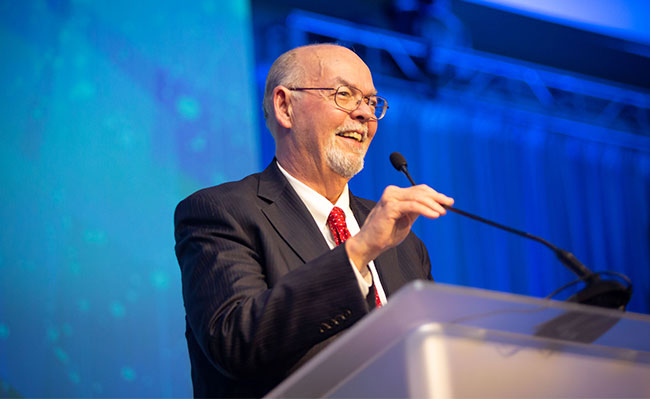
Stephen Shannon, DO, MPH, AACOM President and CEO, welcomes attendees to the annual Awards Banquet.
Educating Leaders 2019, the AACOM Annual Conference, was held April 10-12 at the Washington Marriott Wardman Park Hotel in Washington, DC, under the leadership of Conference Chair Linda Boyd, DO, Senior Associate Dean for Academic Affairs, Rowan University School of Osteopathic Medicine (RowanSOM), and Vice-Chair Patricia Matto, DO, Vice President for Medical Education for the Southeastern Regional Medical Center in Lumberton, NC. With this year’s theme, “Big Data,” Educating Leaders 2019 drew more than 800 participants engaged in three days of thought-provoking plenary presentations, interactive concurrent sessions, special receptions, and other exciting events and collaborative programming focused on timely issues facing our nation’s health care and medical education systems. All abstract submissions for this year’s conference were selected after a thorough and invaluable peer review performed by the esteemed Fellows of the National Academy of Osteopathic Medical Educators (NAOME) and the Assembly of Osteopathic Graduate Medical Educators (AOGME).
The Wednesday, April 10, plenary session was provided by Kyu Rhee, MD, MPP, Vice President and Chief Health Officer of IBM, who spoke on how artificial intelligence will help invent and advance a new era of health. The second day's plenary was given by Eric Warm, MD, FACP, Director of the Internal Medicine Residency Program at the University of Cincinnati. His talk, “Resident Assessment and Big Data—Counting Things and Making it Count,” focused on using statistics and analysis to produce better residency assessments and through them, more prepared and better trained residents. The final plenary on April 12 featured Jennifer Golbeck, PhD, MS, Director of the Social Intelligence Lab at the University of Maryland. Her presentation, titled “Datashock: Artificial Intelligence, Connectedness, and Readying for the Big Data Future,” outlined both the challenges and opportunities Big Data and social networks pose for both health care professionals and individuals.
Dr. Shannon’s Awarded Lifetime Achievement Award; AACOM Welcomes New CEO
During this year’s conference, Stephen C. Shannon, DO, MPH, was honored with the AOGME’s Special Lifetime Achievement Award, presented to members who have been instrumental in advancing the mission and purposes of AOGME through loyal and long-term meritorious service. Dr. Shannon began his role as President and CEO of AACOM in January 2006. Dr. Shannon served as a strong advocate on behalf of the nation’s 35 colleges of osteopathic medicine (COMs), articulating the community’s priorities and positions in a variety of national and international settings. Dr. Shannon has been vigilant in guiding the Association to fulfill its vision and mission, and in positively influencing state, federal, and executive branch policy formulation relative to medical education. Marking his final annual conference as President and CEO of AACOM, Dr. Shannon was honored for his contributions to AACOM and the osteopathic medical education (OME) community during Friday’s Awards Banquet. Several deans and other medical educators shared tributes and letters highlighting Dr. Shannon's accomplishments.

During the conference, Robert A. Cain, DO, FACOI, FAODME, (pictured above) was named as AACOM's next President and CEO. Dr. Cain will start in June. He currently serves as the Associate Dean for Clinical Education at the Ohio University Heritage College of Osteopathic Medicine (OU-HCOM). Dr. Cain was selected after an extensive, six-month nationwide search.
Medical Education
A wide range of speakers representing faculty, students, residents, administrators, and more provided presentations and posters to showcase best practices or research in OME. Presentations covered a wide array of topics such as curriculum, assessments, community health, humanistic medicine, transitioning from UME to GME and so much more. New in 2019, attendees were able to select talks from the following tracks Pre-Clinical, Clinical, GME, Recruiting/Admissions or General Interest.
Before the conference, AACOM’s Administrator Leadership Development Program (ALDP) concluded a year-long program by presenting their group Point-Counterpoint projects and receiving their certificates of completion. The AACOM’s Senior Leadership Development Program (SLDP) kicked off with its year-long program with a workshop. More information on all the AACOM Leadership Institute programs is available on AACOM’s website.
During the conference, the Society for Osteopathic Medical Educators (SOME) hosted two special sessions. The first was a workshop entitled “Readiness for Residency: Collaborating across the Continuum,” featuring panel discussions with Joanne K. Baker, DO, Western Michigan University Homer Stryker MD School of Medicine, Linda Boyd, DO, RowanSOM; John Graneto, DO, CHSU-COM; Schoen W. Kruse, PhD, KCU-COM; Machelle Linsenmeyer, EdD, WVSOM; Trish S. Sexton, DHEd, ATSU-KCOM; Victoria Shuman, DO, WVSOM. The second was a workshop entitled “Updates, Ideas, and Innovations in Entrustable Professional Activities (EPAs).” Machelle Linsenmeyer, EdD, WCUCOM, provided a summary of the findings from the EPA Committee’s National Survey and H. Carrie Chen, MD, PhD, Georgetown University School of Medicine provided a perspective of global trends in EPA implementation. Additionally, the EPA workshop included a poster crawl where COMs showcased their work on implementing EPAs across the continuum of osteopathic medical education.
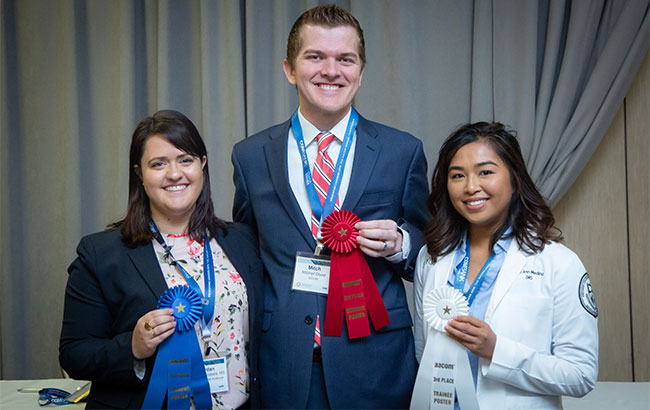
For the first time, this year’s poster session resulted in Faculty, Student, and Trainee best poster winners. Faculty posters included first-place winner Jeritt Tucker, PhD, DMU-COM; second place winner Mary Wurm-Schaar, PhD, OU-HCOM; and third-place winner Randall K. Harris, PhD, WCUCOM. Student posters included first-place winner Jordan A. Johnstone, OMS-II, (pictured left) Western U/COMP-Northwest; second-place winner Mitchell Gleed, DO, (pictured center) AZCOM/MWU; and third-place winner Nikki A. Medina, OMS-II, (pictured right) ARCOM. Trainee posters included first-place winner Roland Haj, DO, Flushing Hospital Medical Center and second-place winner James Wilson, DO, Franciscan Health Olympia Fields, Internal Medicine.
For the second year, a special online edition of abstracts in The Journal of the American Osteopathic Association (JAOA) this summer.
Assembly of Osteopathic Graduate Medical Educators & Graduate Medical Education Initiatives
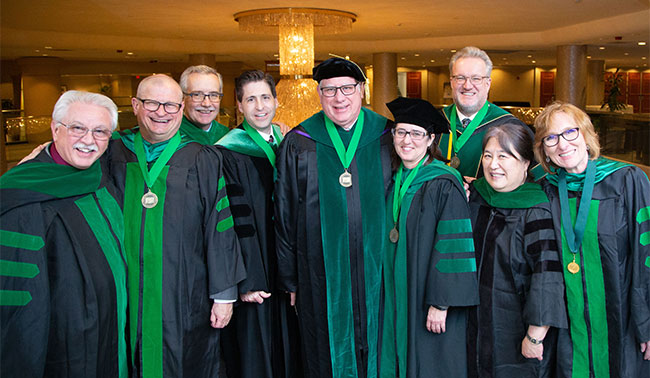
The Assembly of Osteopathic Graduate Medical Educators (AOGME) held several meetings including a gathering of the AOGME Council of GME Leaders, the Annual Membership Luncheon, the Awards and Collegium of Fellows Ceremony, Collegium of Fellows Luncheon, and a New Member Breakfast. AOGME also held an inaugural luncheon for the AOGME Residents and Fellows Council (pictured below), a workshop focused on transitions to practice, and an all-day leadership track for trainees. For the first time this year, AOGME sponsored a residents and fellows poster session which generated several abstract submissions from trainees.
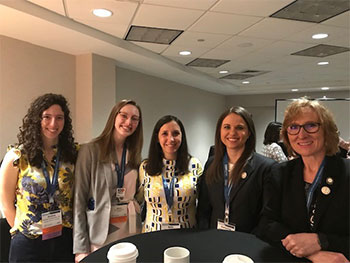 In addition, AACOM hosted the third annual Osteopathic Recognition Pre-conference Workshop which included speakers from the ACGME Osteopathic Principles Committee (OPC), AOA’s Council on Osteopathic GME Development (COGMED), and AACOM staff. Finally, the AACOM UME-GME Continuum Initiative sponsored an all-day pre-conference workshop on student advising and maximizing student match success.
In addition, AACOM hosted the third annual Osteopathic Recognition Pre-conference Workshop which included speakers from the ACGME Osteopathic Principles Committee (OPC), AOA’s Council on Osteopathic GME Development (COGMED), and AACOM staff. Finally, the AACOM UME-GME Continuum Initiative sponsored an all-day pre-conference workshop on student advising and maximizing student match success.
Research
AACOM’s Research Department gave valuable insight into the data that AACOM provides and how that data can be used by our member colleges. Erik Guercio, MA, Director of Research, presented with Sebastián Díaz, PhD, JD, Associate Professor, Family Medicine, Ohio University Heritage College of Osteopathic Medicine (OU-HCOM) on “The AACOM Academic Year Survey of Graduating Seniors: An Invaluable Source of Big Data” on Friday. The session explored how AACOM’s Academic Year Survey of Graduating Seniors serves as an invaluable source of data for promoting data-driven decision-making within osteopathic medical schools. Topics focused on both predictive models obtained from these data and descriptive data visualizations that highlight how the information may be used by osteopathic medical schools.
Educating Leaders 2019 also included the final report on the Project in Osteopathic Medical Education and Empathy (POMEE), a cross-sectional study. Research participants in this phase of the project included five nationwide samples from 41 campuses of U.S. COMs. Sample 1 included 6,009 first-year matriculants who completed the online study survey at the beginning of the 2017-2018 academic year, prior to being exposed to formal medical education. Sample 2 comprised 3,616 first-year students; sample 3 included 2,764 second-year students; sample 4 had 2,413 third-year students; and sample 5 included 1,958 fourth-year students. Samples 2-5 completed the study survey at the end of the 2017-2018 academic year. In addition to the Jefferson Scale of Empathy, subjects received items from the Infrequency Scale of the Zuckerman Kuhlman Personality Questionnaire to measure the degree of students’ attempts to make “good impression” responses (which was used in statistical analyses to control for the social desirability response bias). The survey included an option for students to voluntarily enter their email address to receive feedback on their empathy score and the corresponding national norm table for the assessment of their score, which we used as an indicator of the likelihood that students would provide personal information in Phase II, planned as a longitudinal study scheduled to start in summer 2019. The five national samples fairly represented their respective populations with regards to gender, age, and ethnicity. Cross-sectional comparisons of the JSE scores among students in different years of medical school showed no significant difference within the preclinical phase of medical school (years 1 and 2), nor within the clinical phase of medical school (years 3 and 4). However, a statistically significant lower JSE mean score was obtained by students in the clinical phases of medical school, compared to those in the preclinical phase, but the difference was practically unimportant based on negligible effect size estimates.
Government Relations
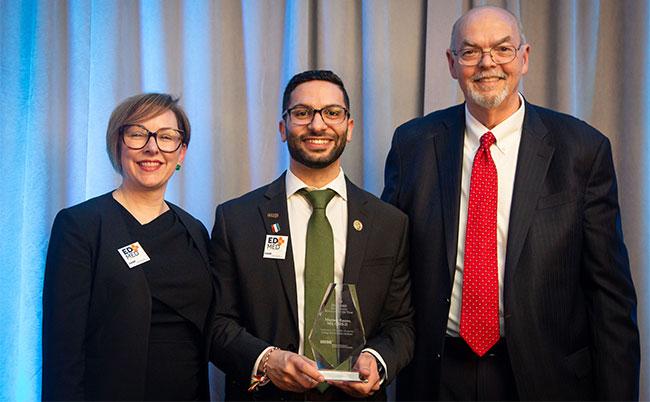
Pamela Murphy, MSW, (left) and Stephen Shannon, DO, MPH, (right) honor Mustafa Basree, MS, (center) as the ED to MED Outstanding Advocate of the Year.
At Educating Leaders 2019, AACOM's Office of Government Relations convened federal officials, osteopathic medical education (OME) leaders, ED to MED national partners, and other stakeholders to discuss issues of importance to the OME community. Conference attendees received an update about opportunities for graduate medical education (GME) expansion through the Veterans Access, Choice, and Accountability Act of 2014 and the VA Maintaining Internal Systems and Strengthening Integrated Outside Networks Act of 2018; learned what intervention efforts are being championed by federal agencies to combat the opioid epidemic, as well as localized efforts being spearheaded by our COMs; were given the opportunity to engage with ED to MED advocates and COM representatives about the connections between federal financial aid programs and a diverse health care workforce; and received a legislative and advocacy update about the federal policies currently impacting OME.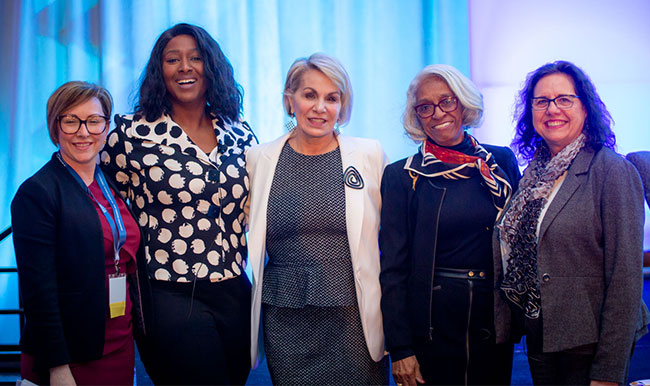
During the conference a select group of female leaders in OME were invited to a professional development event focused on training, networking, and discussing opportunities to support female leadership (pictured above); and all conference attendees were inspired to think more deeply about big data and the social and health implications of artificial intelligence during Friday’s closing plenary. In addition, Mustafa Basree, MS, second-year student at the University of Pikeville-Kentucky College of Osteopathic Medicine (UP-KYCOM), was honored as the 2019 ED to MED Outstanding Advocate of the Year.
In Case You Missed it...
During Educating Leaders 2019, AACOM hosted its third annual Choose DO Medical School Expo, which attracted more than 200 premed and prospective students on Thursday, April 11.
This year’s Board of Deans and Council Leaders Luncheon also took place that day, featuring Martin V. Pusic, MD, PhD, from the New York University School of Medicine’s Institute for Innovation in Medical Education.
That evening a special reception was hosted to honor the work of the Council on Diversity and Equity. The Council seeks to promote evidence-based practices and initiatives on issues related to fostering a culture of diversity and inclusion, especially within OME.
AACOM welcomed attendees to its Annual Awards Banquet on Friday, April 12, where the accomplishments of individuals in the OME community were recognized and celebrated through special tributes and awards ceremonies.
Join us next year for Educating Leaders 2020, which will be held March 25-27 in Washington, DC, under the theme “Advocating Wellness, Advancing Education.”